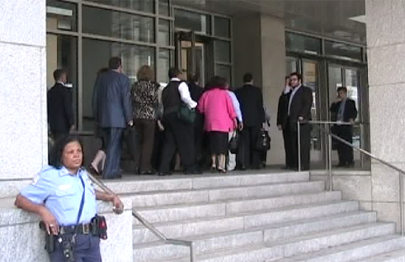Inside CUFI's 2010 Washington "Summit"
An eyewitness report on Christians United For Israel's annual conference
Special to JewsOnFirst.org, November 4, 2010
The photos accompanying this article were taken by Haim Beliak and Jane Hunter of JewsOnFirst outside CUFI's 2009 and 2010 conventions
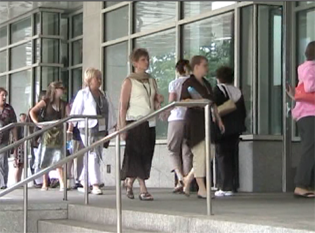
Christians United for Israel's (CUFI) fifth annual Washington Summit, held this past July 20-22, 2010, highlighted once again the persistence and institutionalization of CUFI as the American Christian Zionist organization. As with its previous Summits, it was repeatedly emphasized that the support and love that CUFI and its members have for Israel and the Jewish people – to be sure a very particular kind of support – was based on the Biblical mandate of Christians to do just that. Of course, this is not to be dismissed as a false reason for its support. Indeed the proliferation and popularity of the "prosperity gospel" in contemporary conservative Protestantism has ensured that the repeated refrain of Genesis 12:3 (I will bless those who bless you and curse those who curse you) resonates among the (Christian) leaders of CUFI and its members. This is because it funnels the belief in personal "blessings" (which are almost always considered in financial terms) and national blessings (the furtherance of a conservative social agenda and American global dominance) into the ultimate investment: Israel.
This point was emphasized within the first hour of the opening night of the conference by Diana Hagee (wife of Rev. John Hagee) who pointed out that: "we need to spend more time praying for Israel and less time praying for our personal needs. Life is going to get a whole lot better for us, and trust me, all those other things (one's personal desires) are going to be taken care of [if we bless Israel correctly]." While not false reasons for support (irrespective of how misguided they might be), it was evident that the repeated invocation also served a didactic function for those in attendance – many of whom, as in previous years, cited the importance of Israel in the end-times as reasons for their support – to let them know how they should be responding to questions regarding their support for Israel.
Despite this, the subtle invocations of symbolic eschatological language and logic were evident, not only in the words of the speakers, but also in the jubilant responses from the audience when such symbolism was used. And really, in the context of CUFI, symbolism is all that is needed to convey the eschatological underpinnings of its goals and their mission, despite the sustained refrain to the contrary. This is because the particular end-times message has been around long enough and is more comprehensively conveyed in other mediums that allusion is sufficient to engender the desired understanding from the audience, while not alienating those who don't understand or share the same beliefs.

The use of symbolic language, in a particularly religious context was most evident in the opening session of prayer, in which attendees were instructed on how to effectively pray for Israel, and taught the purpose of their mission. Significantly, the opening prayer session was used as a moment to consecrate the conference and the role of attendees as God's divine agents at a particular point in history (the history of the future), and that they would be blessed accordingly for serving God in this way. In Diana Hagee's words: "God use me, 'til I draw my last breath or better yet till the trumpet sounds!" (That is, until the rapture occurs).
Diana Hagee further elaborated CUFI's prophetic mission when she likened her husband to a modern day prophet:
Watchmen can see into the distance, and there have been three people in history with this prophetic power. Theodore Herzl – although being an unlikely candidate for God's will (as a secular Jew) fulfilled it (and it was made clear that this was concomitant with the help of early Christian Zionists) by pushing for the creation of modern Israel. The second person was Ze'ev Jabotinsky for calling Jews out of Europe prior to the Holocaust. The third is John Hagee. Four years ago, John Hagee called together over 400 leaders to start CUFI and at the time things were good; we had a Christian who supported Israel in the White House and there was little trouble. But he said that in its fifth year we "will know why we are here." And now we are in our fifth year and we know why we are here.
The implication of this – which was not lost on the audience – was that now, the Obama Administration is serving the cause of evil. It is applying further pressure on the Israeli administration to negotiate peace with its Palestinian neighbors, while also attempting to reach out to the Arab and Muslim world – two things which are themselves considered to be harbingers of the end-times because of the "false peace" brought about by the antichrist, and also the establishment of a one-world government, to which international cooperation and diplomacy are frequently portrayed as precursors.
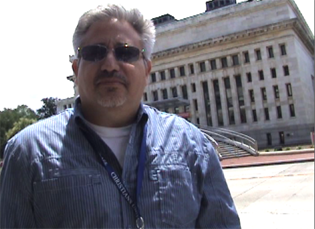
The opening night of the conference coincided with the start of Tisha B'av, the Jewish commemoration and mourning of the destruction of the first and second Temples. It is difficult to discern whether or not Tisha B'av was taken into account prior to the organization of the conference. When asking whether attendees knew what it was, Diana Hagee claimed a willful ignorance, relating that when Rabbi Aryeh Scheinberg used the words "Tisha B'av", she didn't know what it was and thought he could have just as easily been "ordering a sandwich." Although the comment was meant to be light-hearted it seemed to betray a distinct lack of respect for Jewish tradition from an organization that emphatically portrays itself as an embodiment of modern philo-Semitism (admiration for Jews). Nevertheless, the customary reading of the Book of Lamentations proceeded to the delight of the Christian attendees. This commemoration of Tisha B'av at the conference seemed to perform another function: It further consecrated the event, as an historical one of the coming together of Christians and Jews, but more importantly it defined the Jewish speakers at the conference as "real Jews," conferring to them a much greater sense of legitimacy and authority because of their religious devotion. Such adulation is in keeping with our report and reflections on the 2008 Summit (which can be found here.)
The religious and motivational significance of this opening night should not be underestimated. It set the tone for the rest of the conference, which was slowly emptied of overt theological reference to focus on politics and the more practical reasons that Christians need to be supporting Israel, instilling the belief that they have been brought up by God for a mission "at such a time as this." It conveyed to the Christian attendees that they were "walking in the mantle of Esther" – a reference to Queen Esther who saved all the Jews from annihilation, as celebrated during the Jewish holiday of Purim. Importantly for today, the parallel is rendered even more effective due to the fact that the Book of Esther is set in ancient Persia – modern Iran – the current thorn in the side of neoconservatives and also a country with a prominent role in the eschatology of Christian Zionists. Therefore the neoconservative message they received at the various tutorials during the proceeding days became imbued with a sacred meaning despite the very worldly hegemonic goals of those espousing them.
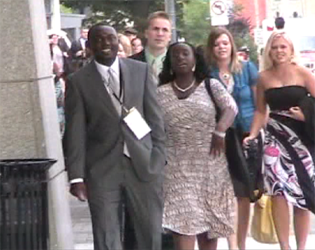
Israel 101: The Basics of the Arab Israeli Conflict
At one of the educational breakout sessions entitled: Israel 101: The Basics of
the Arab Israeli Conflict, Gary Bauer opened the session, highlighting the salience
of fear and emotion used to garner support and to frame issues within a wider cosmic
battle by using his time to speak explicitly about 9/11. The central thrust of Bauer's
argument, was that "the attackers on 9/11, the people causing havoc throughout the
Middle East were not created by poverty or social injustice, they grew out of radical
Islam." Palestinians were further painted with a broad brush as extremists, while
strains of thought that gave the Palestinians a sense of humanity were similarly
disparaged when Bauer later noted that:
It is has become an accepted fact among America's elites that the great majority of the Palestinian people want to live in peace, side by side with the Israeli people – I'm sorry, somebody needs to prove it to me... The reality, ladies and gentlemen is this: evil men, who worship death, they brag about. Evil men who worship death, at this very moment are planning for you and for me, and for Israelis and for free men and women all over the world, sorrows unimaginable to us.
He later went on to state that he does not believe "any peace process will work in the Middle East, until this evil philosophy has been defeated. And then – and only then – Israel will be secure, America will be secure, and we, thank God, will have avoided another dark age." This statement furthered a theme that was evident throughout the conference, which began with the divine mandate given to CUFI by its leaders on the opening night: America and Israel are engaged in a cosmic battle between good and evil, the success of which must be ensured to continue to curry God's favor for the West. Moreover, it subtly shows the continued hostility that CUFI has towards the peace process, preferring to focus on defeating "this evil philosophy", which appeared to be code for an unabated continuity of the "war on terrorism."
Bauer was followed by AIPAC's Jeff Mendelsohn. Mendelsohn opened his speech using language that spoke directly to the eschatological hopes and dreams of many Christian Zionists, describing Israel as "not just a Jewish issue, it is [also] a Christian issue, it is an American issue, it is an issue of importance to the Western world – and I think ultimately, it is an issue of great importance to all of civilization." That is to say, Mendelsohn was engaging Christian Zionists in their belief that Israel is the key to end-times prophecy and the place where God's millennial kingdom will be established after the tribulation; it is the epicenter where civilization will continue after the current world has been rid of evil.
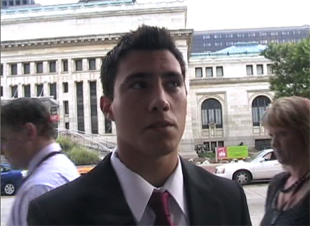
The Iranian Threat
As in previous years enmity towards Iran maintained a strong foothold throughout
the conference. During the second breakout session, The Iranian Threat, self-described
CUFI "repeat offender" and former Reagan official, Frank Gaffney, described Iran
as being "probably within months of operationalizing" its "incipient nuclear capabilities."
Gaffney then told the audience that Iran could use one of these weapons against
the United States in a "catastrophic attack that could literally destroy the country"
through the use of electromagnetic pulse (EMP), a favorite line that John Hagee
has also towed in his numerous books on prophecy. 9/11 was again intoned to remind
attendees of the threat purportedly facing the United States and to link Iran to
those events, when Gaffney described jihad as "the violent form of terror that we
have all come to know particularly since 9/11 but that actually, arguably, was first
waged against us back in 1979 by the Islamic Republic of Iran."
While reminding the audience of this ominous threat, Gaffney quickly altered his focus to the more subtle (and potentially more fear-inducing) threat of "stealth jihad" and the notion that Iran and the rest of the "Muslim world" were unequivocally bent on establishing a global theocracy that would rule over each one of us.
The idea that Iran and other more generic threats from Islam were "stealing a march on us" through this stealth jihad was discussed in terms of the availability of "Shariah compliant finance" as an insidious threat to our way of life: "It is afflicting freedom loving people not just in the Middle East, but Europe, Canada, Latin America, and yes here in the United States as well. We must do what we can to save our country, to save Israel, from these assorted threats. We need to be informed about this one most especially."
The "Ground Zero Mosque" was highlighted as the most ominous characterization of this threat, and elicited the most emotional response from the audience. In Gaffney's words:
Right now, there is a fight brewing over whether we will accede to the latest assertion of Shariah's dominance of our ultimate, inevitable submission to this program, within what I like to call 'spitting distance' of what is arguably for most Americans today, the most sacred ground in this country. I'm talking about Ground Zero. There, in keeping with the traditions of Shariah.... adherents to Shariah, people who have made it absolutely explicit they intend to bring it to America, are now proposing to build within 600 feet within the World Trade Center site, a 13-story building, $100 million for Shariah.... It is part of this supremacist agenda of symbolically and for all time demonstrating the triumph of this Islamic program, on our most sacred soil. I say to you ladies and gentlemen, it is not about faith; Shariah is a totalitarian, political program. It is about conquest. It is about the destruction of freedom of religion, and indeed all civil liberties ... those who adhere to it are our absolutely immutable enemies! They must be defeated!
Clifford May, president of the conservative "Foundation for the Defense of Democracies", also appealed to the attendees' belief in their divine mission, letting them know during the opening of his talk that they were "doing God's work." His talk, followed a similar line to Gaffney's, warning the audience of the goals the Iranian Mullahs' desires to bring the Western World under the control of an Islamic Caliphate. May further entrenched Gaffney's point that "once shariah get its nose, its camel's nose, in the tent, the beast will follow." May then spent most of his talk, traversing quickly between statements by Iranian officials and other leaders in the Muslim world about their purportedly unified effort to bring down the West.
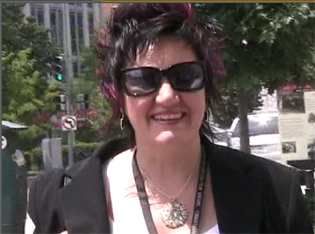
Controversial and incendiary comments about a pre-emptive strike on Iran – which many Christian Zionists see as a catalyst for an attack on Israel purportedly prophesied in Ezekiel 38-39 – that have been made by John Hagee at past conferences were notably absent from this year's Summit. However, May was able to effectively promote the idea by putting the words into the mouth of the ambassador for the United Arab Emirates, as May paraphrased him:
We cannot live with a nuclear Iran. By we [the ambassador] apparently meant the more moderate countries of the Middle East. He went on to add that if sanctions failed to stop Iran's drive for nuclear weapons military force will be the only option left, and it must not be ruled out.
In describing the Iranian threat of nuclear capabilities, Robert Satloff, executive director of The Washington Institute for Near East Policy, also created a sense of urgency. Like the speakers before him, Satloff used some vague terms that are familiar to Christian Zionists regarding the end times, suggesting that the short time needed for Iran to achieve nuclear capability meant that it was "five minutes to midnight." Anyone familiar with John Hagee's book From Daniel to Doomsday or other literature on prophecy will know that certain prophetic events are often demarcated based on their length of time from midnight.
To Satloff's credit he did speak on the importance of the Green movement in Iran and the reality that the country itself is divided, rather than portraying the country as a unified force where the enitre population seeks to destroy the West and Israel through any means necessary. However, this assertion was undercut by Gaffney later during the question and answer period when Gaffney argued that: "Time is running out to support the Greens. We had best be about the business of preparing for military action," to which the crowd responded far more enthusiastically than they did to Satloff's suggestion of the potential to reach out and help the Green movement.
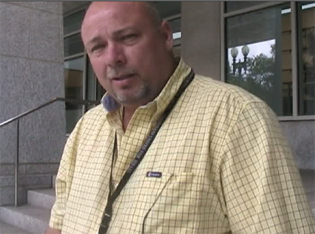
Lobbying Congress
During the "Civics 101" session CUFI's Executive Director, David Brog took time
to steer attendees down a particular path: appeal to American civil religion, but
don't reference your explicit beliefs. He instructed attendees to "tell your congressman
that you are a Christian and you are here for one reason and one reason only: Israel.... It's
a Christian issue, and more importantly, it's an American issue." Something that
again subtly speaks to the belief among Christian Zionists that their, and America's,
failure to support Israel in the way that CUFI defines support will result in divine
punishment for America.
Intent on ensuring that an effective and professional group was representing CUFI to their congressmen and women, while also understanding the true issues that motivate CUFI members, Brog was even more specific:
Please stay on the issue of Israel.... If you care about the issue of life, that's fantastic, but come another day. If you care about the issue of marriage, that's important. Call them another day. We are here for one issue and one issue only. [tell them] 'I'm your constituent, I'm a Christian, I'm here for Israel.' Please don't stray from the talking points.... When in Rome, do as the Romans do ... it is important to speak to policy makers in a language that they understand, and that is the language of policy. Our faith informs and inspires our activism. We're all here because of our faith. But with sadly limited exceptions, most of those guys on Capitol Hill, don't speak the language of faith. With sadly limited exceptions, most of the guys on the Hill are driven by policy considerations, not considerations of faith. So, I ask you this quite seriously. When you go up to a congressman, and you start quoting the Bible, quoting the scripture, talking about a vision you had that's been very important in your life ... they just don't speak that language, and they're not going to be swayed by that language. So unless you know your member well, and you know he's a man of God, we strongly and respectfully request you speak to them in a language that they will understand, the language of policy."
While asking members not to express the specifics of their faith openly, Brog quickly emphasized that he understands and shares the views of the attendees, speaking inclusively, he stated: "We are here because of our faith, but we're doing something important for God if we get these men of power to stand with Israel ... let's speak their language, that's how we will best serve God tomorrow."
Diana Hagee also made a brief appearance during the session as a way to remind attendees of their prophetic mission as a parallel to Brog's more practical requests: "we are chosen for such a time as this to be watchmen on the wall. We're all building our portion of the wall; we're all doing a good work. We have a hammer in one hand and a sword in the other...."
Night To Honor Israel
While Brog emphasized the importance of speaking in the language of policy, rather
than prophecy, to the elected officials,speakers at the culminating Night to Honor
Israel reversed the trend and reinvoked the symbolic, eschatological language that
opened the Summit.
As in previous years, Sentator Joseph Lieberman referred to John Hagee as a "man of God" just like Moses. Similarly, Gary Bauer, after again disparaging the catastrophic threats awaiting Israel and the West proclaimed, "It is for such a time as this, that John Hagee has become a watchman on the wall for Israel who never sleeps."
During his speech John Hagee quickly divided the world into two groups: "those who support Israel, and those who don't. There is no middle ground." Hagee continued to claim, "The free world is at war with radical Islam. Without victory there is no survival. Not for America, not for Israel."
Immediatly following Hagee's speech, his wife Diana took the stage to put pressure on attendees for financial donations. "Our future does not depend on our economy," stated Diana, "our future depends on our obedience to the living God. And if we give, and if we honor God, we can trust him to honor us. Our cause is Israel. Our cause is just. Our cause is right. Our cause is good, and our cause is holy."
Critical Reflections on the 2010 Washington Summit
Throughout the conference a number of observations can be made. Firstly, now in
its fifth year, CUFI has evolved and seems to have tightened it grip on some of
the more stark language that can be easily attacked by its critics. Violent language
calling for preemtive strikes on Iran were softened, and terms like "Islamofascism"
– favorites of John Hagee in other mediums and previous Summits – were notably absent.
Even Frank Gaffney who is openly hostile towards Islam corrected an attendee who
referred to Islam as "Islamofascism" preferring to call it jihad. However, the emphasis
on these issues and the preferred action to be taken against them remained the same
as in previous years. There was also a strong sense that despite CUFI's obvious
purpose being the support of Israel, the interest among many of the Summit attendees
was the salvation of America. Standing with Israel was always framed as an "American
Issue." Senator Joseph Lieberman, after once again comparing John Hagee to Moses,
stated "Support of Israel is as American as apple pie and baseball." It is this
issue that helps confirm the eschatological worldview of participants and leaders
as well. Their absolute belief in Genesis 12:3, combined with a belief in the imminence
of divine judgement propels them to support Israel, ultimately it would seem for
many, to ensure America survives.
